The 5th
LaureateMusic
Mstislav Rostropovich
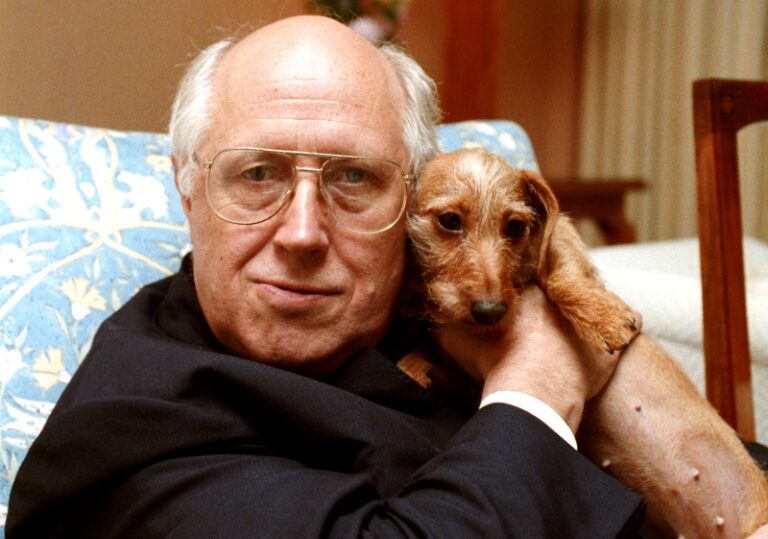
Leaving aside his supreme gifts as a cellist,Mstislav Rostropovich’s artistic career has in itself represented a blow for artistic and personal freedom. As a defender of human rights,Rostropovich found himself in conflict with the Soviet authorities when he sheltered the banned dissident author Alexander Solzhenitsyn in his dacha outside Moscow. Effectively driven out of Russia,he achieved a second glittering career in the West and has made innumerable landmark performances and recordings. In particular,his performances of the Bach Cello Suites,and several modern works by Britten,Dutilleux,Lutoslawki and others,have set him apart from other cellists. Latterly he has developed a career as a conductor and has been a leading interpreter of Russian music,in particular Shostakovich.
Biography
During the 1970s Rostropovich and his wife,the soprano Galina Vishnevskaya,sheltered the banned dissident author Alexander Solzhenitsyn in their dacha outside Moscow. In an open letter to President Brezhnev,they protested the right to artistic freedom and denounced the government restrictions on freedom of speech. For these actions,they were made non-people: all awards and honours were removed,they were forbidden to perform or to record,and eventually they were stripped of Soviet citizenship and driven into exile.
This episode was a watershed in Rostropovich’s career. Having achieved the highest levels within the Soviet state – he won the Stalin Prize in 1951 and 1953 and in 1966 was declared People’s Artist of the USSR – he now found himself acquiring a similar status in exile in the West. Along with the 1974 Annual Award of the International League of Human Rights in recognition of his services to human rights,he was awarded the Knight Commander of the Most Excellent Order of the British Empire,the Officer’s Cross of the Order of Merit of Germany,the Commander of the Legion of Honour of France,the International Prize of Catalonia,the US Presidential Medal of Freedom,and the Swedish Polar Prize. This roll of honour,along with his vast list of musical and academic awards,makes Rostropovich probably the most decorated musician in history. Nevertheless,throughout his exile his passion for Russia was undiminished. The collapse of the Soviet Union in 1990 gave him renewed citizenship,and in 1991 he made the extraordinary move of returning to Moscow unheralded and without a visa to join those in the Russian White House resisting the attempted coup.
Rostropovich was born in Baku,on the western shore of the Caspian Sea. As a child,he had learned a great deal from both his mother,a distinguished pianist,and his father,a fine cellist who had studied with Pablo Casals. At the age of 16 he entered the Moscow Conservatoire,where he studied composition under Shostakovich; his cello playing won him the gold medal in the 1945 All Union Concours of Musicians,placing him immediately at the centre of Russian musical life,even though he had three more years to study at the Moscow Conservatoire. Three facets of his cello playing set him apart: the warmth and richness of his tone,the accuracy of his interpretation and the humility of his approach to the score. The leading composers of the day were keen to compose new cello music for him – he has extended the cello repertoire by commissioning works from Benjamin Britten,Sergei Prokofiev,Dmitri Shostakovich,Witold Lutoslawski,Henri Dutilleux,Alfred Schnittke,Leonard Bernstein and many others. Over the course of time Rostropovich has built up the most comprehensive repertoire ever possessed by a single cellist,making positive efforts to seek out unfamiliar or neglected works for the instrument.
Among his many recordings,his interpretation of the Bach Cello Suites should be singled out as a definitive document,alongside his landmark recordings of the concertos by Dutilleux and Lutoslawski,the Britten Suites and the standard cello repertoire,including the Dvorák concerto and the Tchaikovsky Rococo Variations. Perhaps the most fascinating recordings of all are those retrieved by Rostropovich from the Russian archives,including Shostakovich’s Cello Sonata with the composer at the piano,the première of Britten’s Cello Symphony with the composer conducting,the première of Prokofiev’s Cello Sonata with Sviatoslav Richter at the piano,and rarely heard music by Boris Chaikovsky,Sergei Taneyev,Lev Kniepper and Mieczyslaw Vainberg; all these recordings were made by the Soviet authorities without Rostropovich’s consent between 1950 and 1974.
From the 1950s onwards,he toured the world,finally settling in the USA in 1974. There he began to develop his burgeoning career as a conductor. He became music director of the National Symphony Orchestra in Washington DC in 1977,and subsequently went on to conduct many leading orchestras worldwide,including the London Symphony Orchestra,the New Japan Philharmonic in Tokyo and the Berlin Philharmonic. He is especially well known for his interpretations of the Russian masters,in particular Shostakovich,whose double-edged music parallels the conflict between artistic expression and repressive government that was so familiar to Rostropovich.
Rostropovich is a citizen of the world. He has achieved this genuine and unusual status by virtue of an heroic career as a cellist,conductor,pianist and teacher,characterised by a great humanity and a fearless defence of the principles of artistic freedom and human rights. He has devoted much time and energy to promoting and assisting young artists in developing their careers and talents. He has often put his life and liberty at risk in order to serve and to liberate his fellow man. At the centre of his being is music,which has the extraordinary power to affect people directly. Rostropovich’s skills as an interpreter have greatly magnified this power.
Andrew Hugill
He passed away on 27 April,2007,Moscow
Chronology
Solzhenitsyn sheltered from persecution by Rostropovich and Vishnevskaya
Awarded the Gold Medal of the Royal Philharmonic Society of London
Made Knight of the British Empire
Recording: Schnittke Concerto for Three
-
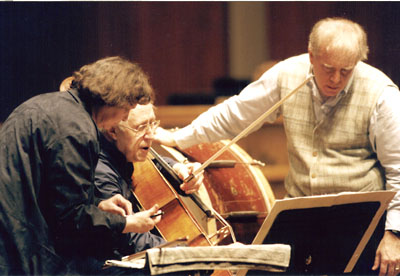
Rostropovich with Sofia Gubaidulina and Leonard Slatkin
-
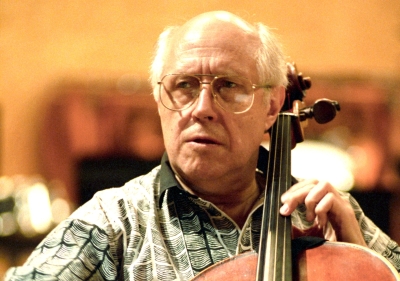
Rehearsal at Evian Festival
-
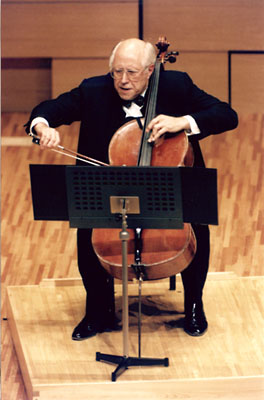
Commemorative Concert
-
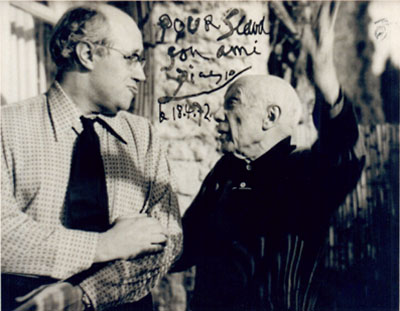
Rostropovich with Picasso, 1972

